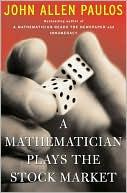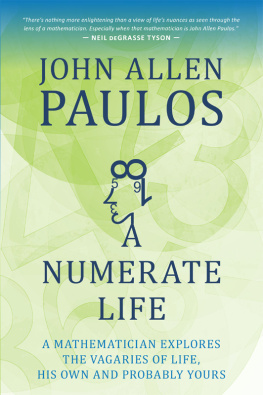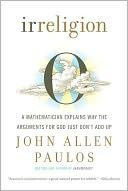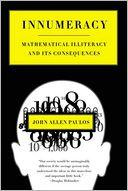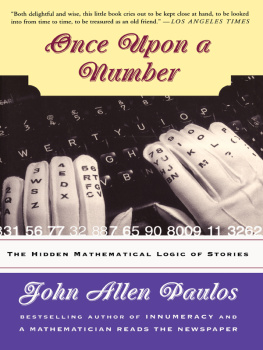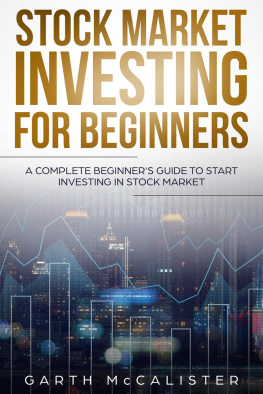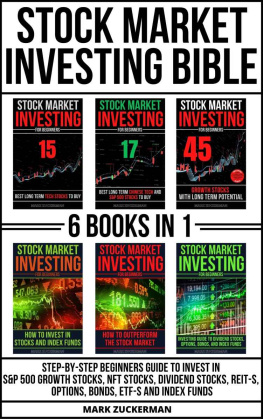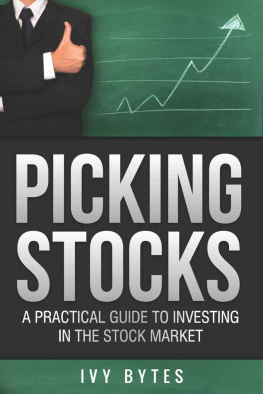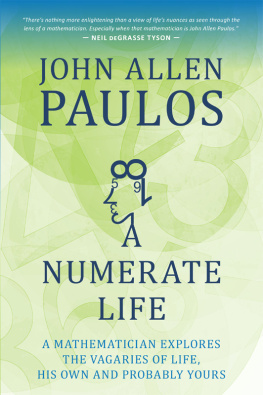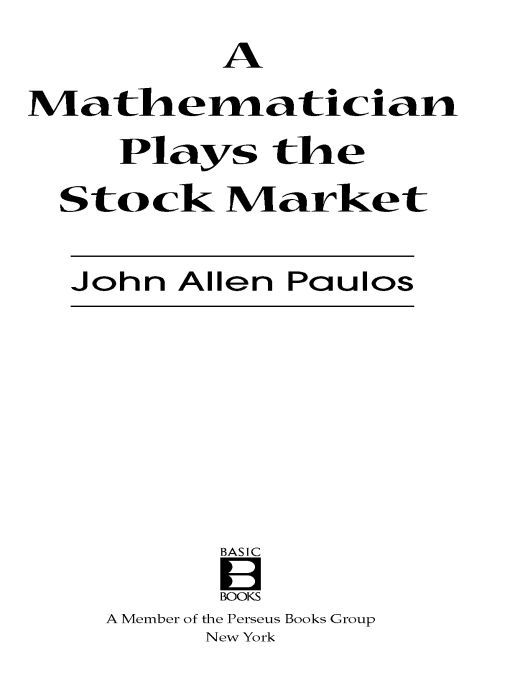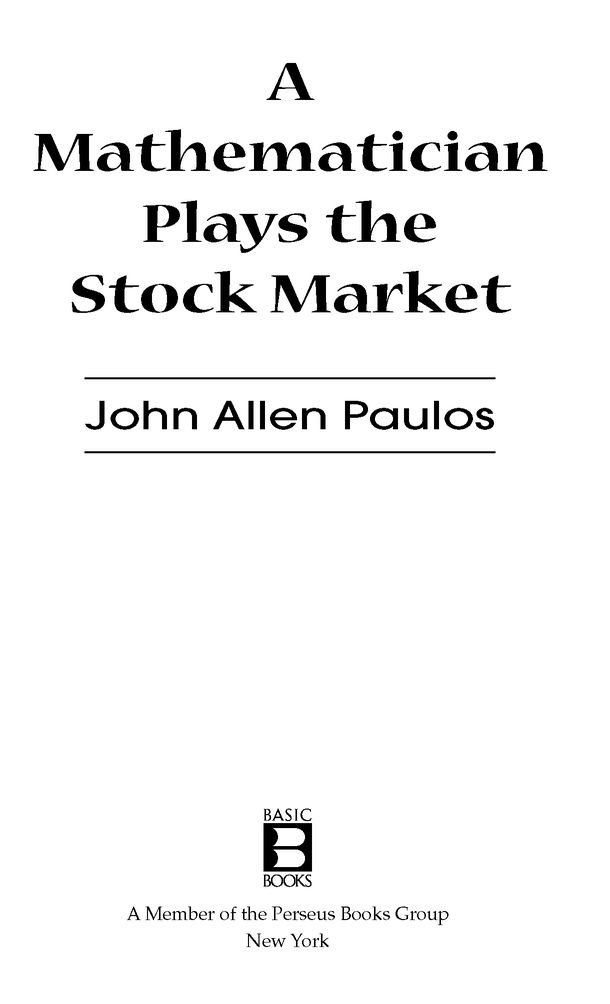Table of Contents
Also byJohn Allen Paulos
Mathematics and Humor (1980)
I Think Therefore I Laugh (1985)
Innumeracy: Mathematical Illiteracy and its Consequences (1988)
Beyond Numeracy: Ruminations of a Numbers Man (1991)
A Mathematician Reads the Newspaper (1995)
Once Upon a Number: The Hidden Mathematical Logic of Stories (1998)
To my father, who never played the market and knew little about probability, yet understood one of the prime lessons of both. Uncertainty, he would say, is the only certainty there is, and knowing how to live with insecurity is the only security.
1
Anticipating Others Anticipations
It was early 2000, the market was booming, and my investments in various index funds were doing well but not generating much excitement. Why investments should generate excitement is another issue, but it seemed that many people were genuinely enjoying the active management of their portfolios. So when I received a small and totally unexpected chunk of money, I placed it into what Richard Thaler, a behavioral economist Ill return to later, calls a separate mental account. I considered it, in effect, mad money.
Nothing distinguished the money from other assets of mine except this private designation, but being so classified made my modest windfall more vulnerable to whim. In this case it entrained a series of ill-fated investment decisions that, even now, are excruciating to recall. The psychological ease with which such funds tend to be spent was no doubt a factor in my using the unexpected money to buy some shares of WorldCom (abbreviated WCOM), the pre-eminent global communications company for the digital generation, as its ads boasted, at $47 per share. (Hereafter Ill generally use WCOM to refer to the stock and WorldCom to refer to the company.)
Today, of course, WorldCom is synonymous with business fraud, but in the halcyon late 1990s it seemed an irrepressibly successful devourer of high-tech telecommunications companies. Bernie Ebbers, the founder and former CEO, is now viewed by many as a pirate, but then he was seen as a swashbuckler. I had read about the company, knew that high-tech guru George Gilder had been long and fervently singing its praises, and was aware that among its holdings were MCI, the huge long-distance telephone company, and UUNet, the backbone of the Internet. I spend a lot of time on the net (home is where you hang your @) so I found Gilders lyrical writings on the telecosm and the glories of unlimited bandwidth particularly seductive.
I also knew that, unlike most dot-com companies with no money coming in and few customers, WorldCom had more than $25 billion in revenues and almost 25 million customers, and so when several people I knew told me that WorldCom was a strong buy, I was receptive to their suggestion. Although the stock had recently fallen a little in price, it was, I was assured, likely to soon surpass its previous high of $64.
If this was all there was to it, there would have been no important financial consequences for me, and I wouldnt be writing about the investment now. Alas, there was something else, or rather a whole series of something elses. After buying the shares, I found myself idly wondering, why not buy more? I dont think of myself as a gambler, but I willed myself not to think, willed myself simply to act, willed myself to buy more shares of WCOM, shares that cost considerably more than the few Id already bought. Nor were these the last shares I would buy. Usually a hardheaded fellow, I was nevertheless falling disastrously in love.
Although my particular heartthrob was WCOM, almost all of what I will say about my experience is unfortunately applicable to many other stocks and many other investors. Wherever WCOM appears, you may wish to substitute the symbols for Lucent, Tyco, Intel, Yahoo, AOL-Time Warner, Global Crossing, Enron, Adelphia, or, perhaps, the generic symbols WOE or BANE. The time frame of the bookin the midst of a market collapse after a heady, nearly decade-long surgemay also appear rather more specific and constraining than it is. Almost all the points made herein are rather general or can be generalized with a little common sense.
Falling in Love with WorldCom
John Maynard Keynes, arguably the greatest economist of the twentieth century, likened the position of short-term investors in a stock market to that of readers in a newspaper beauty contest (popular in his day). The ostensible task of the readers is to pick the five prettiest out of, say, one hundred contestants, but their real job is more complicated. The reason is that the newspaper rewards them with small prizes only if they pick the five contestants who receive the most votes from readers. That is, they must pick the contestants that they think are most likely to be picked by the other readers, and the other readers must try to do the same. Theyre not to become enamored of any of the contestants or otherwise give undue weight to their own taste. Rather they must, in Keynes words, anticipate what average opinion expects the average opinion to be (or, worse, anticipate what the average opinion expects the average opinion expects the average opinion to be).
Thus it may be that, as in politics, the golden touch derives oddly from being in tune with the brass masses. People might dismiss rumors, for example, about Enronitis or World-Comism affecting the companies in which theyve invested, but if they believe others will believe the rumors, they cant afford to ignore them.
BWC (before WorldCom) such social calculations never interested me much. I didnt find the market particularly inspiring or exalted and viewed it simply as a way to trade shares in businesses. Studying the market wasnt nearly as engaging as doing mathematics or philosophy or watching the Comedy Network. Thus, taking Keynes literally and not having much confidence in my judgment of popular taste, I refrained from investing in individual stocks. In addition, I believed that stock movements were entirely random and that trying to outsmart dice was a fools errand. The bulk of my money therefore went into broad-gauge stock index funds.
AWC, however, I deviated from this generally wise course. Fathoming the market, to the extent possible, and predicting it, if at all possible, suddenly became live issues. Instead of snidely dismissing the business talk shows vapid talk, sports-caster-ish attitudes, and empty prognostication, I began to search for what of substance might underlie all the commentary about the market and slowly changed my mind about some matters. I also sought to account for my own sometimes foolish behavior, instances of which will appear throughout the book, and tried to reconcile it with my understanding of the mathematics underlying the market.
Lest you dread a cloyingly personal account of how I lost my shirt (or at least had my sleeves shortened), I should stress that my primary purpose here is to lay out, elucidate, and explore the basic conceptual mathematics of the market. Ill examinelargely via vignettes and stories rather than formulas and equationsvarious approaches to investing as well as a number of problems, paradoxes, and puzzles, some old, some new, that encapsulate issues associated with the market. Is it efficient? Random? Is there anything to technical analysis, fundamental analysis? How can one quantify risk? What is the role of cognitive illusion? Of common knowledge? What are the most common scams? What are options, portfolio theory, short-selling, the efficient market hypothesis? Does the normal bell-shaped curve explain the markets occasional extreme volatility? What about fractals, chaos, and other non-standard tools? There will be no explicit investment advice and certainly no segments devoted to the ten best stocks for the new millennium, the five smartest ways to jump-start your 401(k), or the three savviest steps you can take right now. In short, therell be no financial pornography.


